Professional Development: Skills, Competencies, and Learning Theories
VerifiedAdded on 2023/01/11
|8
|2508
|30
Report
AI Summary
This report examines the importance of ongoing professional development within Marriott International, focusing on the benefits for various stakeholders, including employees and employers. It details the skills and competencies expected by employers, such as professional appearance, ethical conduct, and effective communication. The report includes a SWOT analysis to assess personal abilities for a Food and Beverage Manager role and discusses various learning theories and approaches, including behaviorist, cognitive, and humanist approaches, as well as Kolb’s Learning Cycle and Social Learning Theory. Marriott International's development options, like formal training and on-job training, are also highlighted. Desklib provides this assignment solution and many other resources for students.
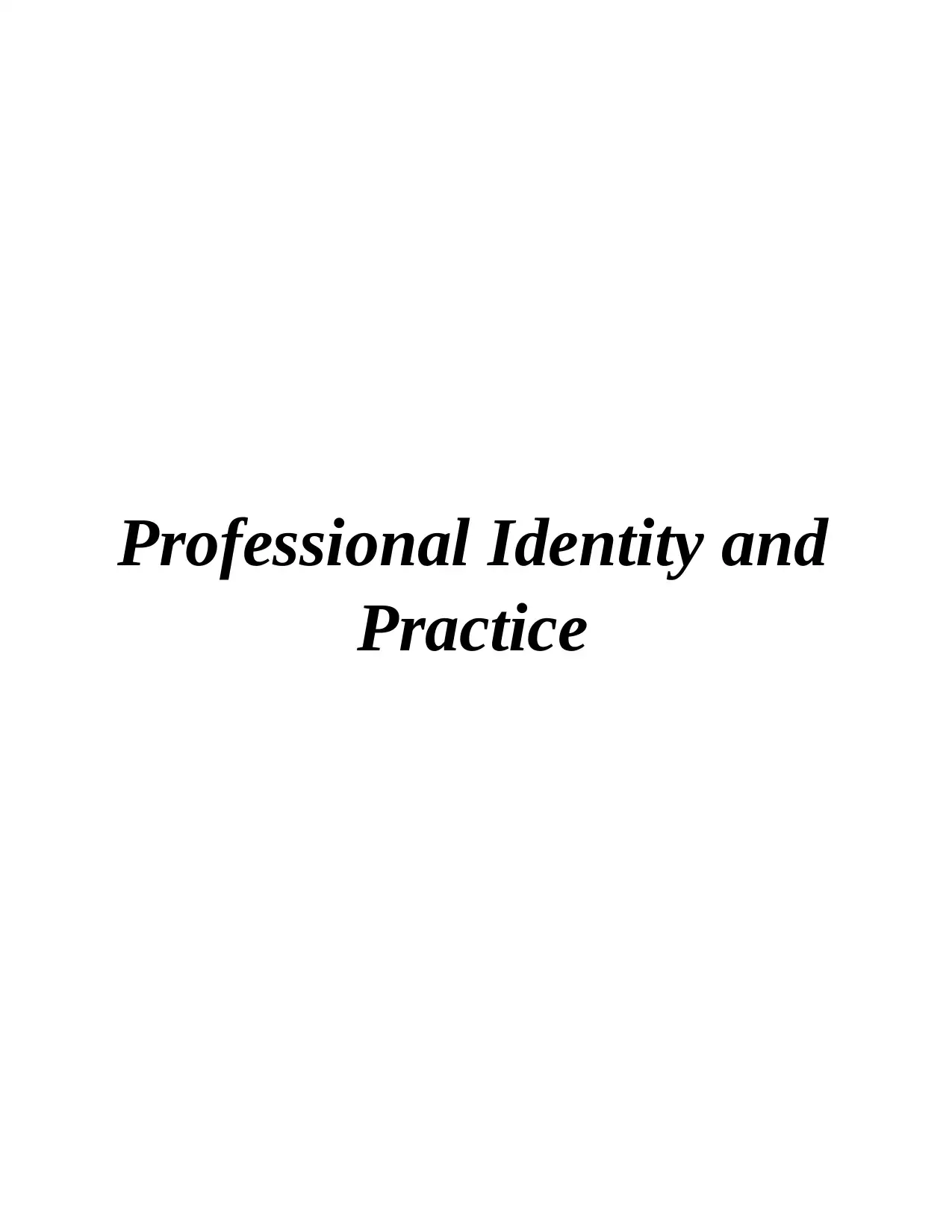
Professional Identity and
Practice
Practice
Paraphrase This Document
Need a fresh take? Get an instant paraphrase of this document with our AI Paraphraser
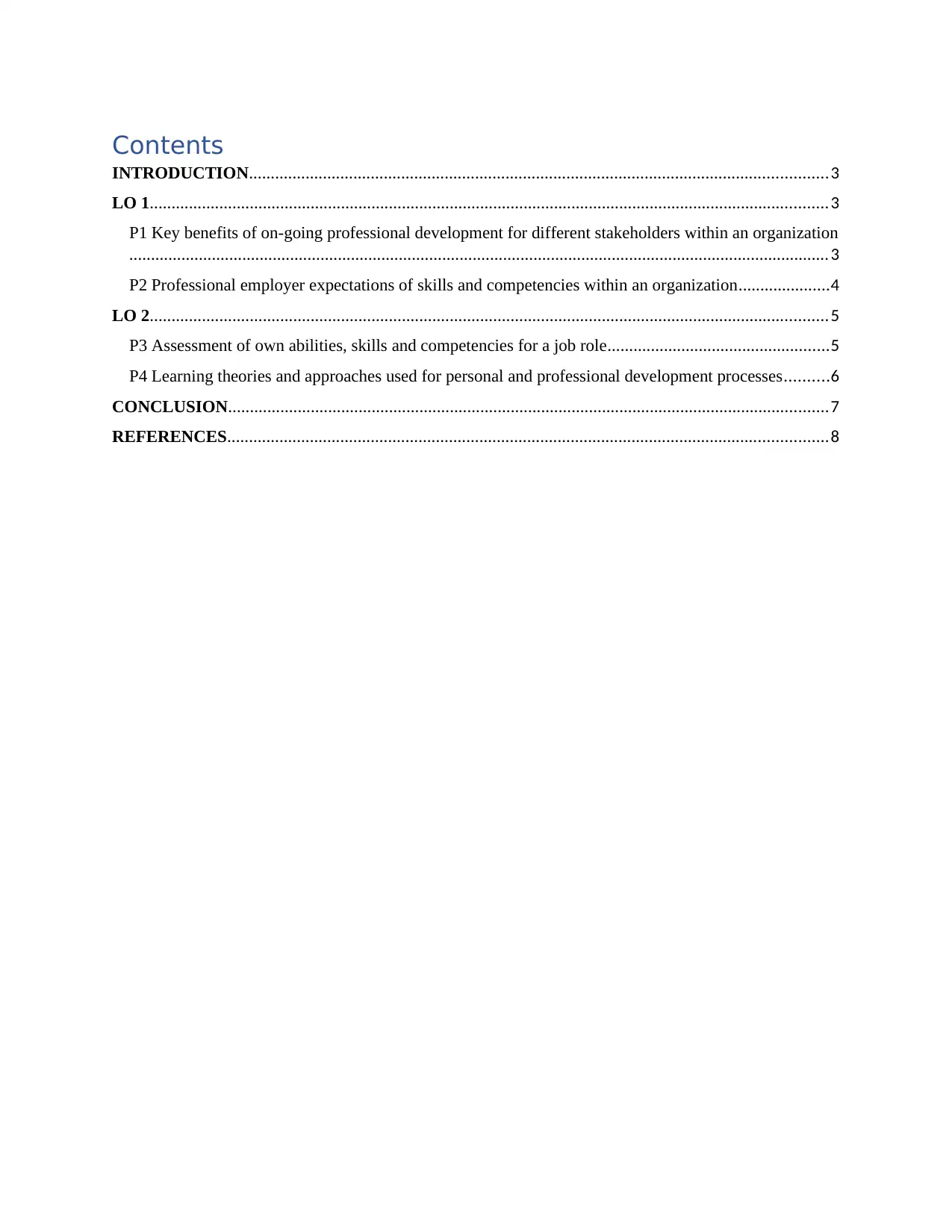
Contents
INTRODUCTION.....................................................................................................................................3
LO 1............................................................................................................................................................3
P1 Key benefits of on-going professional development for different stakeholders within an organization
.................................................................................................................................................................3
P2 Professional employer expectations of skills and competencies within an organization.....................4
LO 2............................................................................................................................................................5
P3 Assessment of own abilities, skills and competencies for a job role...................................................5
P4 Learning theories and approaches used for personal and professional development processes..........6
CONCLUSION..........................................................................................................................................7
REFERENCES..........................................................................................................................................8
INTRODUCTION.....................................................................................................................................3
LO 1............................................................................................................................................................3
P1 Key benefits of on-going professional development for different stakeholders within an organization
.................................................................................................................................................................3
P2 Professional employer expectations of skills and competencies within an organization.....................4
LO 2............................................................................................................................................................5
P3 Assessment of own abilities, skills and competencies for a job role...................................................5
P4 Learning theories and approaches used for personal and professional development processes..........6
CONCLUSION..........................................................................................................................................7
REFERENCES..........................................................................................................................................8
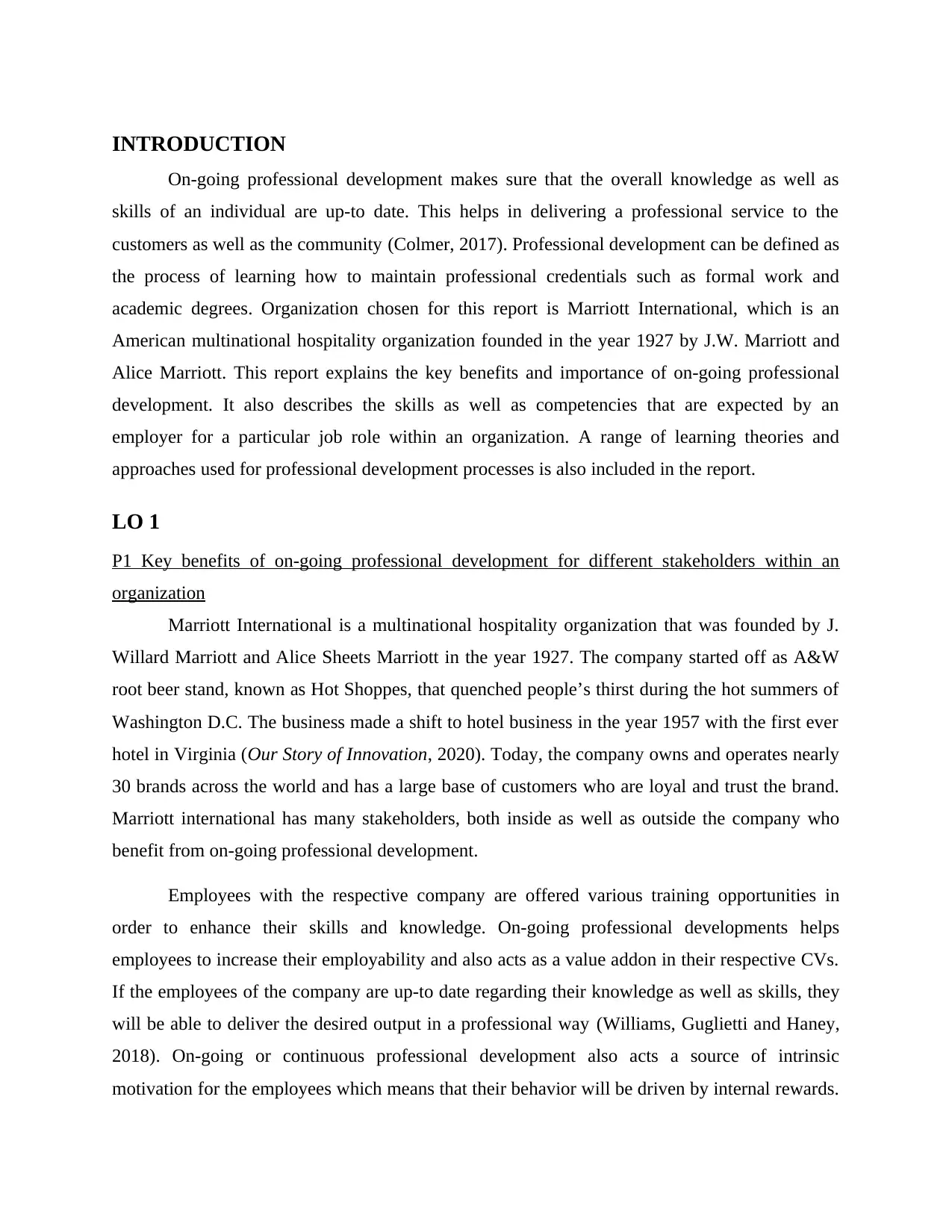
INTRODUCTION
On-going professional development makes sure that the overall knowledge as well as
skills of an individual are up-to date. This helps in delivering a professional service to the
customers as well as the community (Colmer, 2017). Professional development can be defined as
the process of learning how to maintain professional credentials such as formal work and
academic degrees. Organization chosen for this report is Marriott International, which is an
American multinational hospitality organization founded in the year 1927 by J.W. Marriott and
Alice Marriott. This report explains the key benefits and importance of on-going professional
development. It also describes the skills as well as competencies that are expected by an
employer for a particular job role within an organization. A range of learning theories and
approaches used for professional development processes is also included in the report.
LO 1
P1 Key benefits of on-going professional development for different stakeholders within an
organization
Marriott International is a multinational hospitality organization that was founded by J.
Willard Marriott and Alice Sheets Marriott in the year 1927. The company started off as A&W
root beer stand, known as Hot Shoppes, that quenched people’s thirst during the hot summers of
Washington D.C. The business made a shift to hotel business in the year 1957 with the first ever
hotel in Virginia (Our Story of Innovation, 2020). Today, the company owns and operates nearly
30 brands across the world and has a large base of customers who are loyal and trust the brand.
Marriott international has many stakeholders, both inside as well as outside the company who
benefit from on-going professional development.
Employees with the respective company are offered various training opportunities in
order to enhance their skills and knowledge. On-going professional developments helps
employees to increase their employability and also acts as a value addon in their respective CVs.
If the employees of the company are up-to date regarding their knowledge as well as skills, they
will be able to deliver the desired output in a professional way (Williams, Guglietti and Haney,
2018). On-going or continuous professional development also acts a source of intrinsic
motivation for the employees which means that their behavior will be driven by internal rewards.
On-going professional development makes sure that the overall knowledge as well as
skills of an individual are up-to date. This helps in delivering a professional service to the
customers as well as the community (Colmer, 2017). Professional development can be defined as
the process of learning how to maintain professional credentials such as formal work and
academic degrees. Organization chosen for this report is Marriott International, which is an
American multinational hospitality organization founded in the year 1927 by J.W. Marriott and
Alice Marriott. This report explains the key benefits and importance of on-going professional
development. It also describes the skills as well as competencies that are expected by an
employer for a particular job role within an organization. A range of learning theories and
approaches used for professional development processes is also included in the report.
LO 1
P1 Key benefits of on-going professional development for different stakeholders within an
organization
Marriott International is a multinational hospitality organization that was founded by J.
Willard Marriott and Alice Sheets Marriott in the year 1927. The company started off as A&W
root beer stand, known as Hot Shoppes, that quenched people’s thirst during the hot summers of
Washington D.C. The business made a shift to hotel business in the year 1957 with the first ever
hotel in Virginia (Our Story of Innovation, 2020). Today, the company owns and operates nearly
30 brands across the world and has a large base of customers who are loyal and trust the brand.
Marriott international has many stakeholders, both inside as well as outside the company who
benefit from on-going professional development.
Employees with the respective company are offered various training opportunities in
order to enhance their skills and knowledge. On-going professional developments helps
employees to increase their employability and also acts as a value addon in their respective CVs.
If the employees of the company are up-to date regarding their knowledge as well as skills, they
will be able to deliver the desired output in a professional way (Williams, Guglietti and Haney,
2018). On-going or continuous professional development also acts a source of intrinsic
motivation for the employees which means that their behavior will be driven by internal rewards.
⊘ This is a preview!⊘
Do you want full access?
Subscribe today to unlock all pages.

Trusted by 1+ million students worldwide
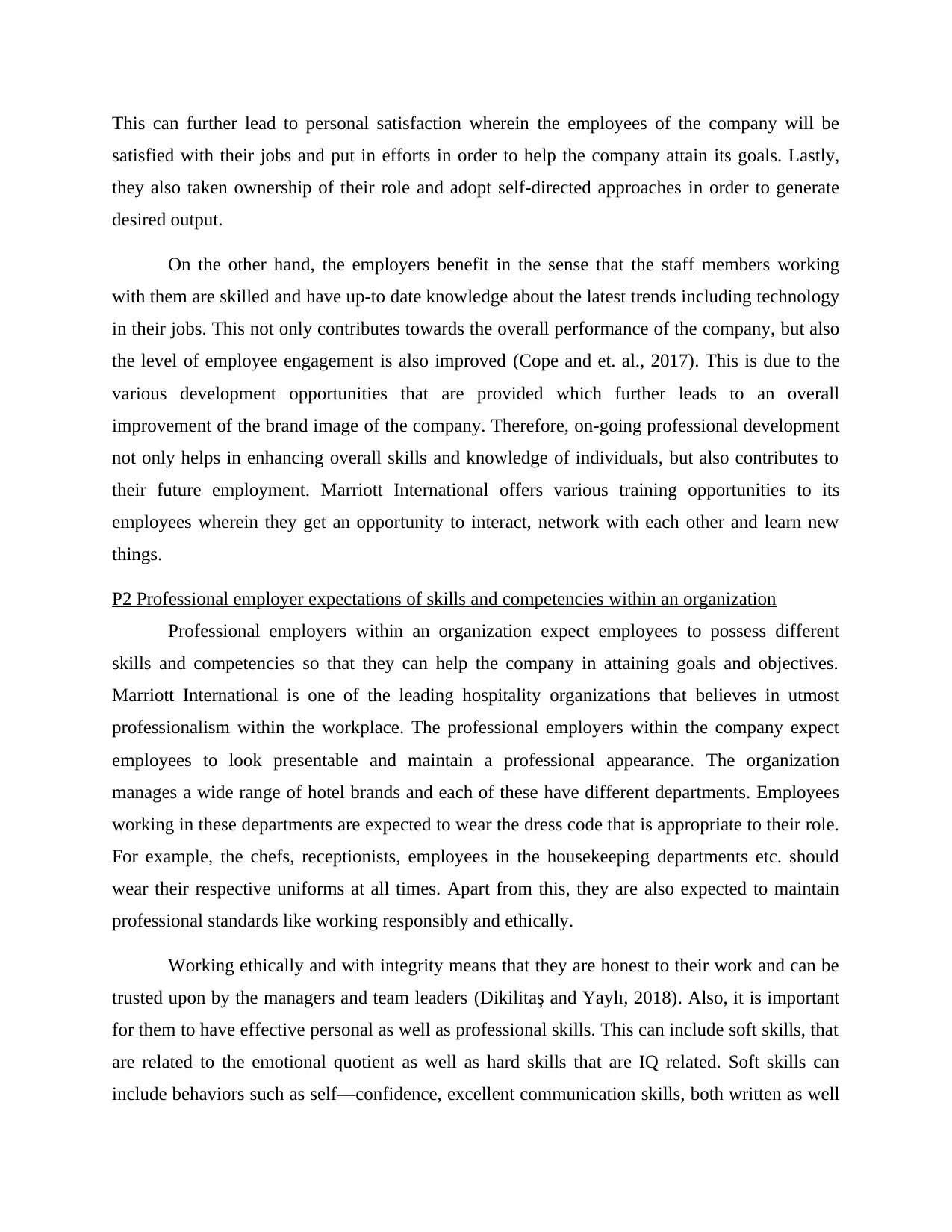
This can further lead to personal satisfaction wherein the employees of the company will be
satisfied with their jobs and put in efforts in order to help the company attain its goals. Lastly,
they also taken ownership of their role and adopt self-directed approaches in order to generate
desired output.
On the other hand, the employers benefit in the sense that the staff members working
with them are skilled and have up-to date knowledge about the latest trends including technology
in their jobs. This not only contributes towards the overall performance of the company, but also
the level of employee engagement is also improved (Cope and et. al., 2017). This is due to the
various development opportunities that are provided which further leads to an overall
improvement of the brand image of the company. Therefore, on-going professional development
not only helps in enhancing overall skills and knowledge of individuals, but also contributes to
their future employment. Marriott International offers various training opportunities to its
employees wherein they get an opportunity to interact, network with each other and learn new
things.
P2 Professional employer expectations of skills and competencies within an organization
Professional employers within an organization expect employees to possess different
skills and competencies so that they can help the company in attaining goals and objectives.
Marriott International is one of the leading hospitality organizations that believes in utmost
professionalism within the workplace. The professional employers within the company expect
employees to look presentable and maintain a professional appearance. The organization
manages a wide range of hotel brands and each of these have different departments. Employees
working in these departments are expected to wear the dress code that is appropriate to their role.
For example, the chefs, receptionists, employees in the housekeeping departments etc. should
wear their respective uniforms at all times. Apart from this, they are also expected to maintain
professional standards like working responsibly and ethically.
Working ethically and with integrity means that they are honest to their work and can be
trusted upon by the managers and team leaders (Dikilitaş and Yaylı, 2018). Also, it is important
for them to have effective personal as well as professional skills. This can include soft skills, that
are related to the emotional quotient as well as hard skills that are IQ related. Soft skills can
include behaviors such as self—confidence, excellent communication skills, both written as well
satisfied with their jobs and put in efforts in order to help the company attain its goals. Lastly,
they also taken ownership of their role and adopt self-directed approaches in order to generate
desired output.
On the other hand, the employers benefit in the sense that the staff members working
with them are skilled and have up-to date knowledge about the latest trends including technology
in their jobs. This not only contributes towards the overall performance of the company, but also
the level of employee engagement is also improved (Cope and et. al., 2017). This is due to the
various development opportunities that are provided which further leads to an overall
improvement of the brand image of the company. Therefore, on-going professional development
not only helps in enhancing overall skills and knowledge of individuals, but also contributes to
their future employment. Marriott International offers various training opportunities to its
employees wherein they get an opportunity to interact, network with each other and learn new
things.
P2 Professional employer expectations of skills and competencies within an organization
Professional employers within an organization expect employees to possess different
skills and competencies so that they can help the company in attaining goals and objectives.
Marriott International is one of the leading hospitality organizations that believes in utmost
professionalism within the workplace. The professional employers within the company expect
employees to look presentable and maintain a professional appearance. The organization
manages a wide range of hotel brands and each of these have different departments. Employees
working in these departments are expected to wear the dress code that is appropriate to their role.
For example, the chefs, receptionists, employees in the housekeeping departments etc. should
wear their respective uniforms at all times. Apart from this, they are also expected to maintain
professional standards like working responsibly and ethically.
Working ethically and with integrity means that they are honest to their work and can be
trusted upon by the managers and team leaders (Dikilitaş and Yaylı, 2018). Also, it is important
for them to have effective personal as well as professional skills. This can include soft skills, that
are related to the emotional quotient as well as hard skills that are IQ related. Soft skills can
include behaviors such as self—confidence, excellent communication skills, both written as well
Paraphrase This Document
Need a fresh take? Get an instant paraphrase of this document with our AI Paraphraser
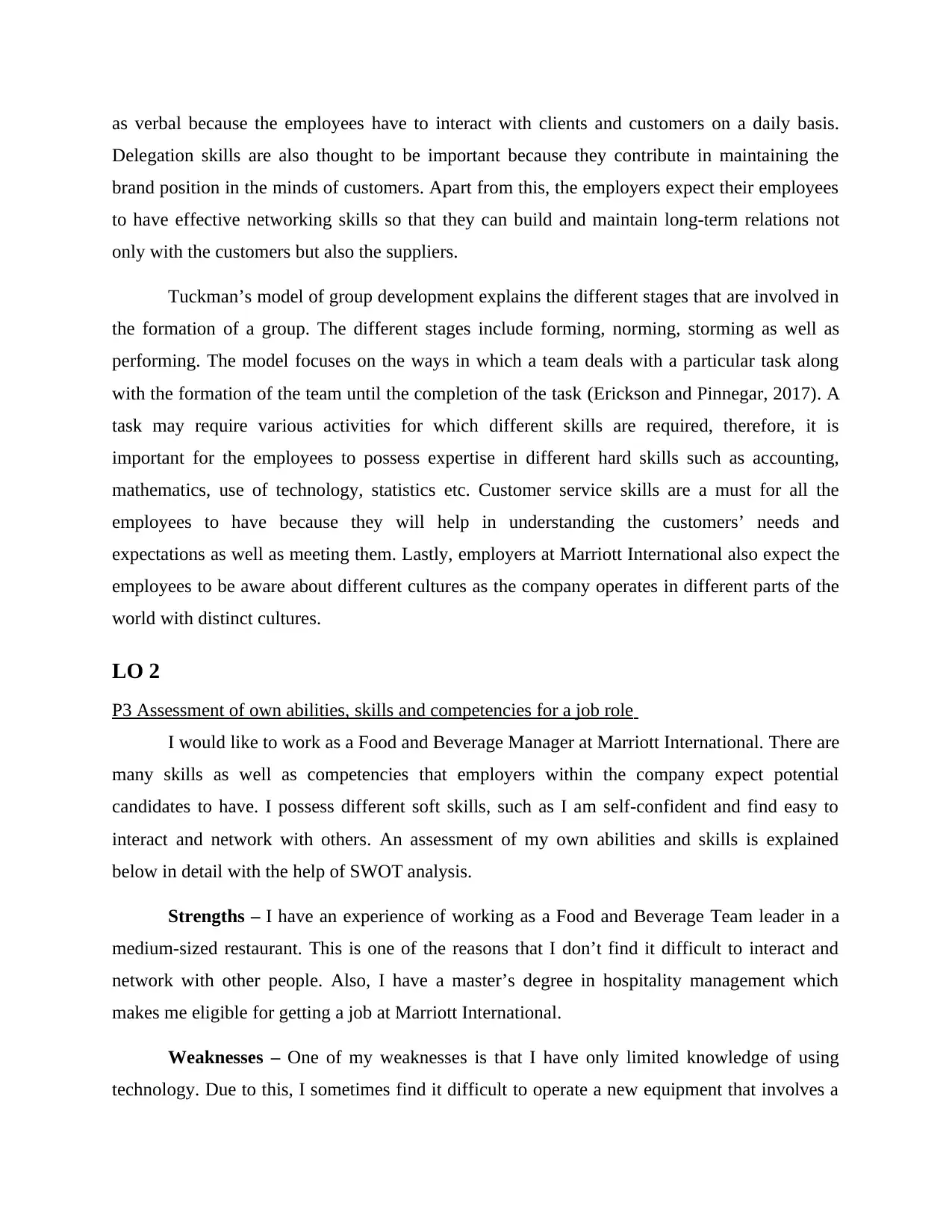
as verbal because the employees have to interact with clients and customers on a daily basis.
Delegation skills are also thought to be important because they contribute in maintaining the
brand position in the minds of customers. Apart from this, the employers expect their employees
to have effective networking skills so that they can build and maintain long-term relations not
only with the customers but also the suppliers.
Tuckman’s model of group development explains the different stages that are involved in
the formation of a group. The different stages include forming, norming, storming as well as
performing. The model focuses on the ways in which a team deals with a particular task along
with the formation of the team until the completion of the task (Erickson and Pinnegar, 2017). A
task may require various activities for which different skills are required, therefore, it is
important for the employees to possess expertise in different hard skills such as accounting,
mathematics, use of technology, statistics etc. Customer service skills are a must for all the
employees to have because they will help in understanding the customers’ needs and
expectations as well as meeting them. Lastly, employers at Marriott International also expect the
employees to be aware about different cultures as the company operates in different parts of the
world with distinct cultures.
LO 2
P3 Assessment of own abilities, skills and competencies for a job role
I would like to work as a Food and Beverage Manager at Marriott International. There are
many skills as well as competencies that employers within the company expect potential
candidates to have. I possess different soft skills, such as I am self-confident and find easy to
interact and network with others. An assessment of my own abilities and skills is explained
below in detail with the help of SWOT analysis.
Strengths – I have an experience of working as a Food and Beverage Team leader in a
medium-sized restaurant. This is one of the reasons that I don’t find it difficult to interact and
network with other people. Also, I have a master’s degree in hospitality management which
makes me eligible for getting a job at Marriott International.
Weaknesses – One of my weaknesses is that I have only limited knowledge of using
technology. Due to this, I sometimes find it difficult to operate a new equipment that involves a
Delegation skills are also thought to be important because they contribute in maintaining the
brand position in the minds of customers. Apart from this, the employers expect their employees
to have effective networking skills so that they can build and maintain long-term relations not
only with the customers but also the suppliers.
Tuckman’s model of group development explains the different stages that are involved in
the formation of a group. The different stages include forming, norming, storming as well as
performing. The model focuses on the ways in which a team deals with a particular task along
with the formation of the team until the completion of the task (Erickson and Pinnegar, 2017). A
task may require various activities for which different skills are required, therefore, it is
important for the employees to possess expertise in different hard skills such as accounting,
mathematics, use of technology, statistics etc. Customer service skills are a must for all the
employees to have because they will help in understanding the customers’ needs and
expectations as well as meeting them. Lastly, employers at Marriott International also expect the
employees to be aware about different cultures as the company operates in different parts of the
world with distinct cultures.
LO 2
P3 Assessment of own abilities, skills and competencies for a job role
I would like to work as a Food and Beverage Manager at Marriott International. There are
many skills as well as competencies that employers within the company expect potential
candidates to have. I possess different soft skills, such as I am self-confident and find easy to
interact and network with others. An assessment of my own abilities and skills is explained
below in detail with the help of SWOT analysis.
Strengths – I have an experience of working as a Food and Beverage Team leader in a
medium-sized restaurant. This is one of the reasons that I don’t find it difficult to interact and
network with other people. Also, I have a master’s degree in hospitality management which
makes me eligible for getting a job at Marriott International.
Weaknesses – One of my weaknesses is that I have only limited knowledge of using
technology. Due to this, I sometimes find it difficult to operate a new equipment that involves a
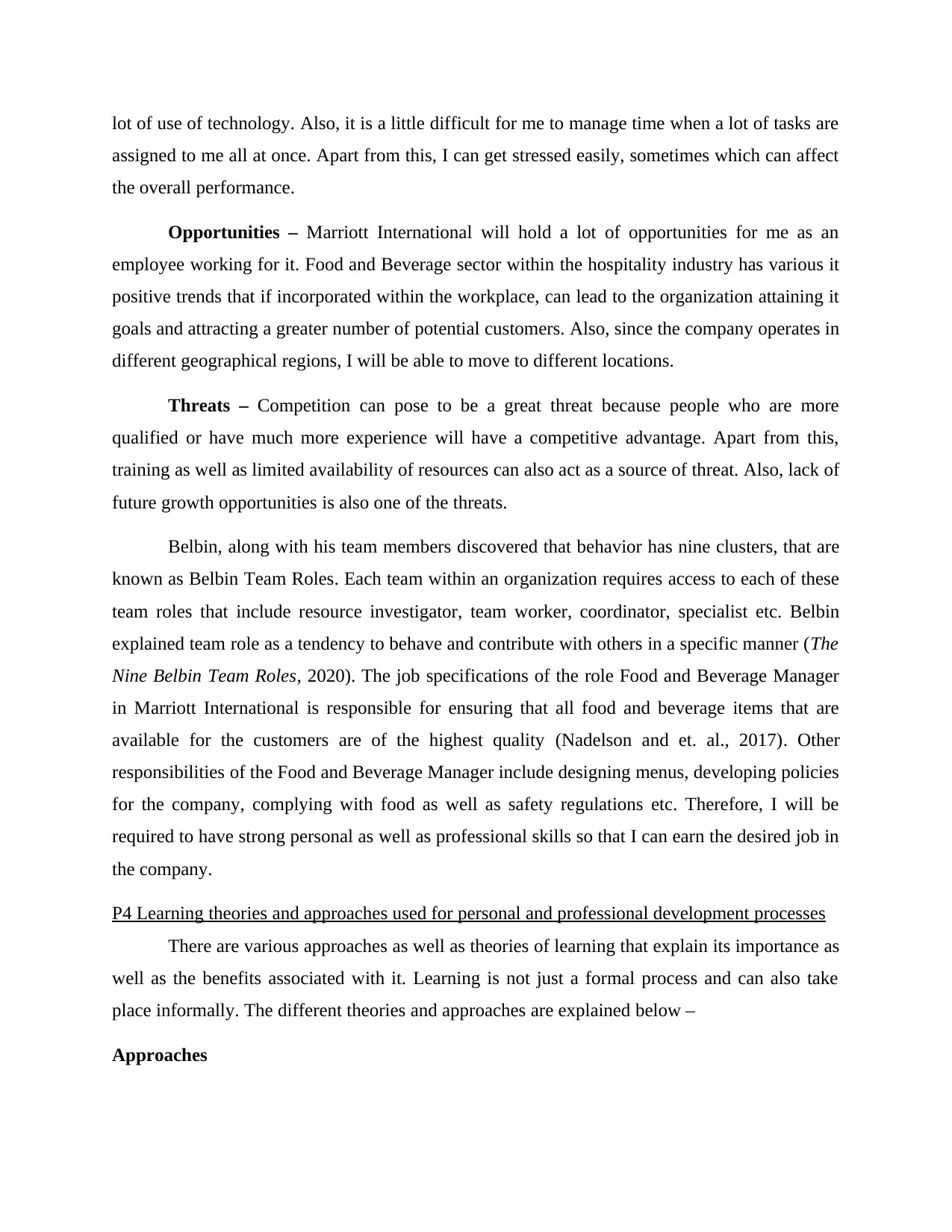
lot of use of technology. Also, it is a little difficult for me to manage time when a lot of tasks are
assigned to me all at once. Apart from this, I can get stressed easily, sometimes which can affect
the overall performance.
Opportunities – Marriott International will hold a lot of opportunities for me as an
employee working for it. Food and Beverage sector within the hospitality industry has various it
positive trends that if incorporated within the workplace, can lead to the organization attaining it
goals and attracting a greater number of potential customers. Also, since the company operates in
different geographical regions, I will be able to move to different locations.
Threats – Competition can pose to be a great threat because people who are more
qualified or have much more experience will have a competitive advantage. Apart from this,
training as well as limited availability of resources can also act as a source of threat. Also, lack of
future growth opportunities is also one of the threats.
Belbin, along with his team members discovered that behavior has nine clusters, that are
known as Belbin Team Roles. Each team within an organization requires access to each of these
team roles that include resource investigator, team worker, coordinator, specialist etc. Belbin
explained team role as a tendency to behave and contribute with others in a specific manner (The
Nine Belbin Team Roles, 2020). The job specifications of the role Food and Beverage Manager
in Marriott International is responsible for ensuring that all food and beverage items that are
available for the customers are of the highest quality (Nadelson and et. al., 2017). Other
responsibilities of the Food and Beverage Manager include designing menus, developing policies
for the company, complying with food as well as safety regulations etc. Therefore, I will be
required to have strong personal as well as professional skills so that I can earn the desired job in
the company.
P4 Learning theories and approaches used for personal and professional development processes
There are various approaches as well as theories of learning that explain its importance as
well as the benefits associated with it. Learning is not just a formal process and can also take
place informally. The different theories and approaches are explained below –
Approaches
assigned to me all at once. Apart from this, I can get stressed easily, sometimes which can affect
the overall performance.
Opportunities – Marriott International will hold a lot of opportunities for me as an
employee working for it. Food and Beverage sector within the hospitality industry has various it
positive trends that if incorporated within the workplace, can lead to the organization attaining it
goals and attracting a greater number of potential customers. Also, since the company operates in
different geographical regions, I will be able to move to different locations.
Threats – Competition can pose to be a great threat because people who are more
qualified or have much more experience will have a competitive advantage. Apart from this,
training as well as limited availability of resources can also act as a source of threat. Also, lack of
future growth opportunities is also one of the threats.
Belbin, along with his team members discovered that behavior has nine clusters, that are
known as Belbin Team Roles. Each team within an organization requires access to each of these
team roles that include resource investigator, team worker, coordinator, specialist etc. Belbin
explained team role as a tendency to behave and contribute with others in a specific manner (The
Nine Belbin Team Roles, 2020). The job specifications of the role Food and Beverage Manager
in Marriott International is responsible for ensuring that all food and beverage items that are
available for the customers are of the highest quality (Nadelson and et. al., 2017). Other
responsibilities of the Food and Beverage Manager include designing menus, developing policies
for the company, complying with food as well as safety regulations etc. Therefore, I will be
required to have strong personal as well as professional skills so that I can earn the desired job in
the company.
P4 Learning theories and approaches used for personal and professional development processes
There are various approaches as well as theories of learning that explain its importance as
well as the benefits associated with it. Learning is not just a formal process and can also take
place informally. The different theories and approaches are explained below –
Approaches
⊘ This is a preview!⊘
Do you want full access?
Subscribe today to unlock all pages.

Trusted by 1+ million students worldwide
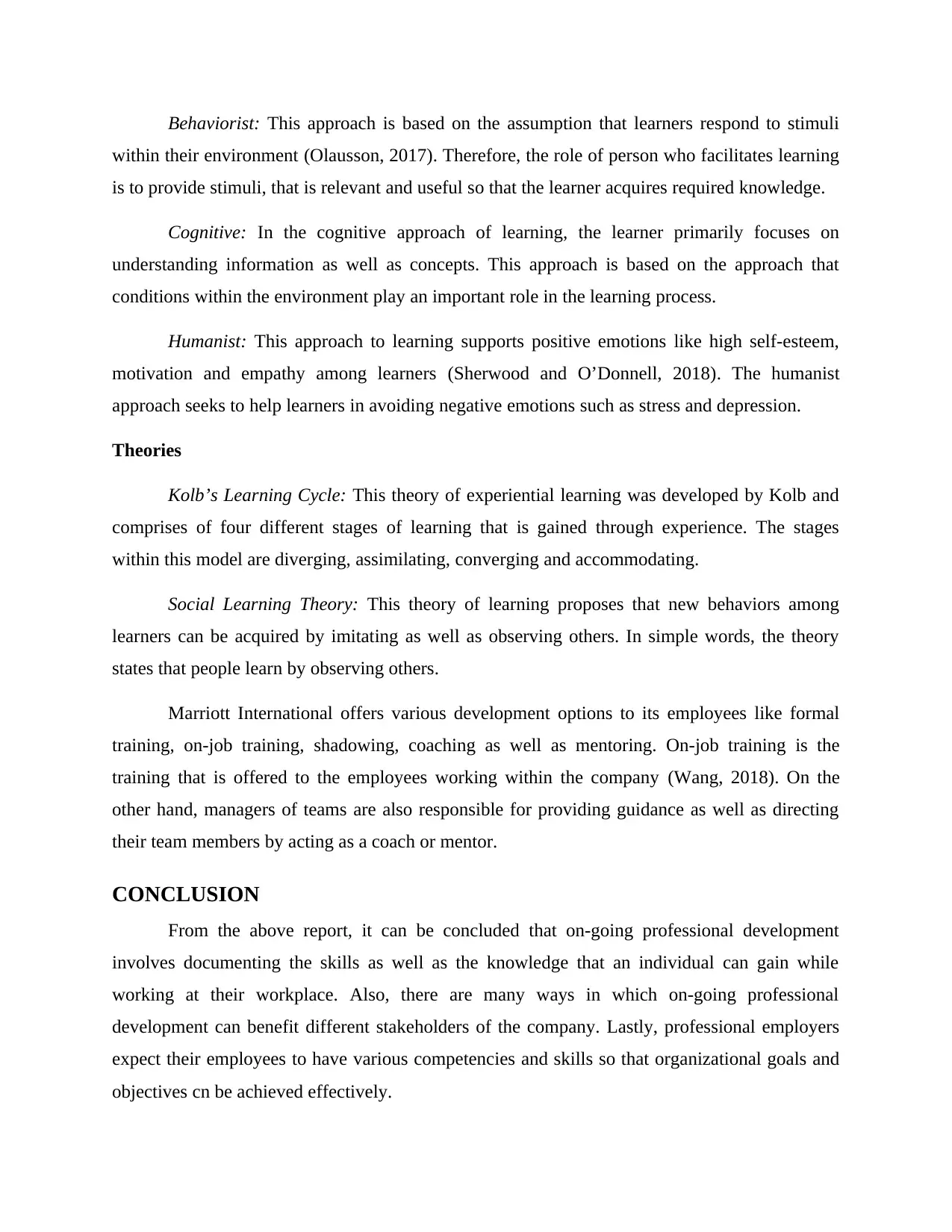
Behaviorist: This approach is based on the assumption that learners respond to stimuli
within their environment (Olausson, 2017). Therefore, the role of person who facilitates learning
is to provide stimuli, that is relevant and useful so that the learner acquires required knowledge.
Cognitive: In the cognitive approach of learning, the learner primarily focuses on
understanding information as well as concepts. This approach is based on the approach that
conditions within the environment play an important role in the learning process.
Humanist: This approach to learning supports positive emotions like high self-esteem,
motivation and empathy among learners (Sherwood and O’Donnell, 2018). The humanist
approach seeks to help learners in avoiding negative emotions such as stress and depression.
Theories
Kolb’s Learning Cycle: This theory of experiential learning was developed by Kolb and
comprises of four different stages of learning that is gained through experience. The stages
within this model are diverging, assimilating, converging and accommodating.
Social Learning Theory: This theory of learning proposes that new behaviors among
learners can be acquired by imitating as well as observing others. In simple words, the theory
states that people learn by observing others.
Marriott International offers various development options to its employees like formal
training, on-job training, shadowing, coaching as well as mentoring. On-job training is the
training that is offered to the employees working within the company (Wang, 2018). On the
other hand, managers of teams are also responsible for providing guidance as well as directing
their team members by acting as a coach or mentor.
CONCLUSION
From the above report, it can be concluded that on-going professional development
involves documenting the skills as well as the knowledge that an individual can gain while
working at their workplace. Also, there are many ways in which on-going professional
development can benefit different stakeholders of the company. Lastly, professional employers
expect their employees to have various competencies and skills so that organizational goals and
objectives cn be achieved effectively.
within their environment (Olausson, 2017). Therefore, the role of person who facilitates learning
is to provide stimuli, that is relevant and useful so that the learner acquires required knowledge.
Cognitive: In the cognitive approach of learning, the learner primarily focuses on
understanding information as well as concepts. This approach is based on the approach that
conditions within the environment play an important role in the learning process.
Humanist: This approach to learning supports positive emotions like high self-esteem,
motivation and empathy among learners (Sherwood and O’Donnell, 2018). The humanist
approach seeks to help learners in avoiding negative emotions such as stress and depression.
Theories
Kolb’s Learning Cycle: This theory of experiential learning was developed by Kolb and
comprises of four different stages of learning that is gained through experience. The stages
within this model are diverging, assimilating, converging and accommodating.
Social Learning Theory: This theory of learning proposes that new behaviors among
learners can be acquired by imitating as well as observing others. In simple words, the theory
states that people learn by observing others.
Marriott International offers various development options to its employees like formal
training, on-job training, shadowing, coaching as well as mentoring. On-job training is the
training that is offered to the employees working within the company (Wang, 2018). On the
other hand, managers of teams are also responsible for providing guidance as well as directing
their team members by acting as a coach or mentor.
CONCLUSION
From the above report, it can be concluded that on-going professional development
involves documenting the skills as well as the knowledge that an individual can gain while
working at their workplace. Also, there are many ways in which on-going professional
development can benefit different stakeholders of the company. Lastly, professional employers
expect their employees to have various competencies and skills so that organizational goals and
objectives cn be achieved effectively.
Paraphrase This Document
Need a fresh take? Get an instant paraphrase of this document with our AI Paraphraser
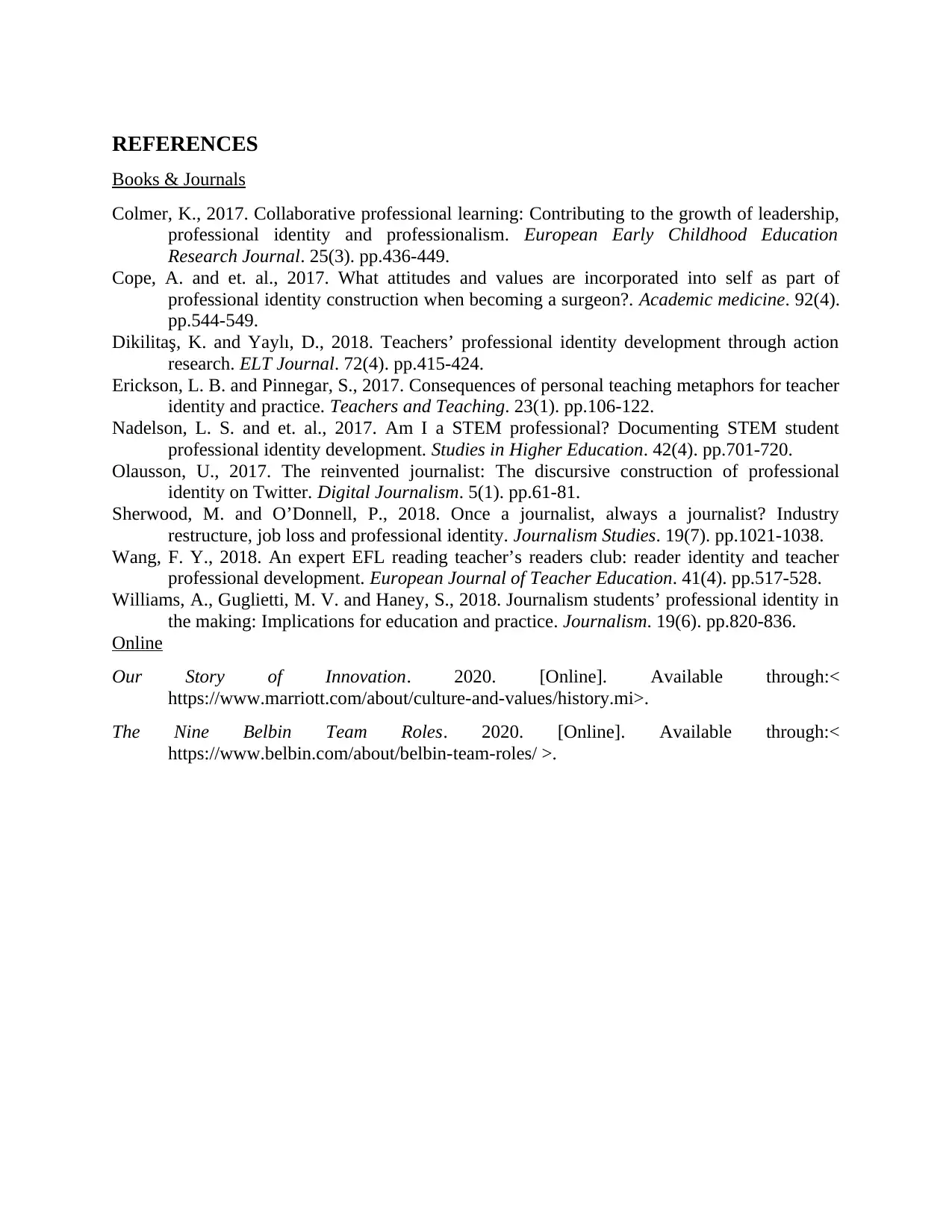
REFERENCES
Books & Journals
Colmer, K., 2017. Collaborative professional learning: Contributing to the growth of leadership,
professional identity and professionalism. European Early Childhood Education
Research Journal. 25(3). pp.436-449.
Cope, A. and et. al., 2017. What attitudes and values are incorporated into self as part of
professional identity construction when becoming a surgeon?. Academic medicine. 92(4).
pp.544-549.
Dikilitaş, K. and Yaylı, D., 2018. Teachers’ professional identity development through action
research. ELT Journal. 72(4). pp.415-424.
Erickson, L. B. and Pinnegar, S., 2017. Consequences of personal teaching metaphors for teacher
identity and practice. Teachers and Teaching. 23(1). pp.106-122.
Nadelson, L. S. and et. al., 2017. Am I a STEM professional? Documenting STEM student
professional identity development. Studies in Higher Education. 42(4). pp.701-720.
Olausson, U., 2017. The reinvented journalist: The discursive construction of professional
identity on Twitter. Digital Journalism. 5(1). pp.61-81.
Sherwood, M. and O’Donnell, P., 2018. Once a journalist, always a journalist? Industry
restructure, job loss and professional identity. Journalism Studies. 19(7). pp.1021-1038.
Wang, F. Y., 2018. An expert EFL reading teacher’s readers club: reader identity and teacher
professional development. European Journal of Teacher Education. 41(4). pp.517-528.
Williams, A., Guglietti, M. V. and Haney, S., 2018. Journalism students’ professional identity in
the making: Implications for education and practice. Journalism. 19(6). pp.820-836.
Online
Our Story of Innovation. 2020. [Online]. Available through:<
https://www.marriott.com/about/culture-and-values/history.mi>.
The Nine Belbin Team Roles. 2020. [Online]. Available through:<
https://www.belbin.com/about/belbin-team-roles/ >.
Books & Journals
Colmer, K., 2017. Collaborative professional learning: Contributing to the growth of leadership,
professional identity and professionalism. European Early Childhood Education
Research Journal. 25(3). pp.436-449.
Cope, A. and et. al., 2017. What attitudes and values are incorporated into self as part of
professional identity construction when becoming a surgeon?. Academic medicine. 92(4).
pp.544-549.
Dikilitaş, K. and Yaylı, D., 2018. Teachers’ professional identity development through action
research. ELT Journal. 72(4). pp.415-424.
Erickson, L. B. and Pinnegar, S., 2017. Consequences of personal teaching metaphors for teacher
identity and practice. Teachers and Teaching. 23(1). pp.106-122.
Nadelson, L. S. and et. al., 2017. Am I a STEM professional? Documenting STEM student
professional identity development. Studies in Higher Education. 42(4). pp.701-720.
Olausson, U., 2017. The reinvented journalist: The discursive construction of professional
identity on Twitter. Digital Journalism. 5(1). pp.61-81.
Sherwood, M. and O’Donnell, P., 2018. Once a journalist, always a journalist? Industry
restructure, job loss and professional identity. Journalism Studies. 19(7). pp.1021-1038.
Wang, F. Y., 2018. An expert EFL reading teacher’s readers club: reader identity and teacher
professional development. European Journal of Teacher Education. 41(4). pp.517-528.
Williams, A., Guglietti, M. V. and Haney, S., 2018. Journalism students’ professional identity in
the making: Implications for education and practice. Journalism. 19(6). pp.820-836.
Online
Our Story of Innovation. 2020. [Online]. Available through:<
https://www.marriott.com/about/culture-and-values/history.mi>.
The Nine Belbin Team Roles. 2020. [Online]. Available through:<
https://www.belbin.com/about/belbin-team-roles/ >.
1 out of 8
Related Documents
Your All-in-One AI-Powered Toolkit for Academic Success.
+13062052269
info@desklib.com
Available 24*7 on WhatsApp / Email
![[object Object]](/_next/static/media/star-bottom.7253800d.svg)
Unlock your academic potential
Copyright © 2020–2026 A2Z Services. All Rights Reserved. Developed and managed by ZUCOL.




